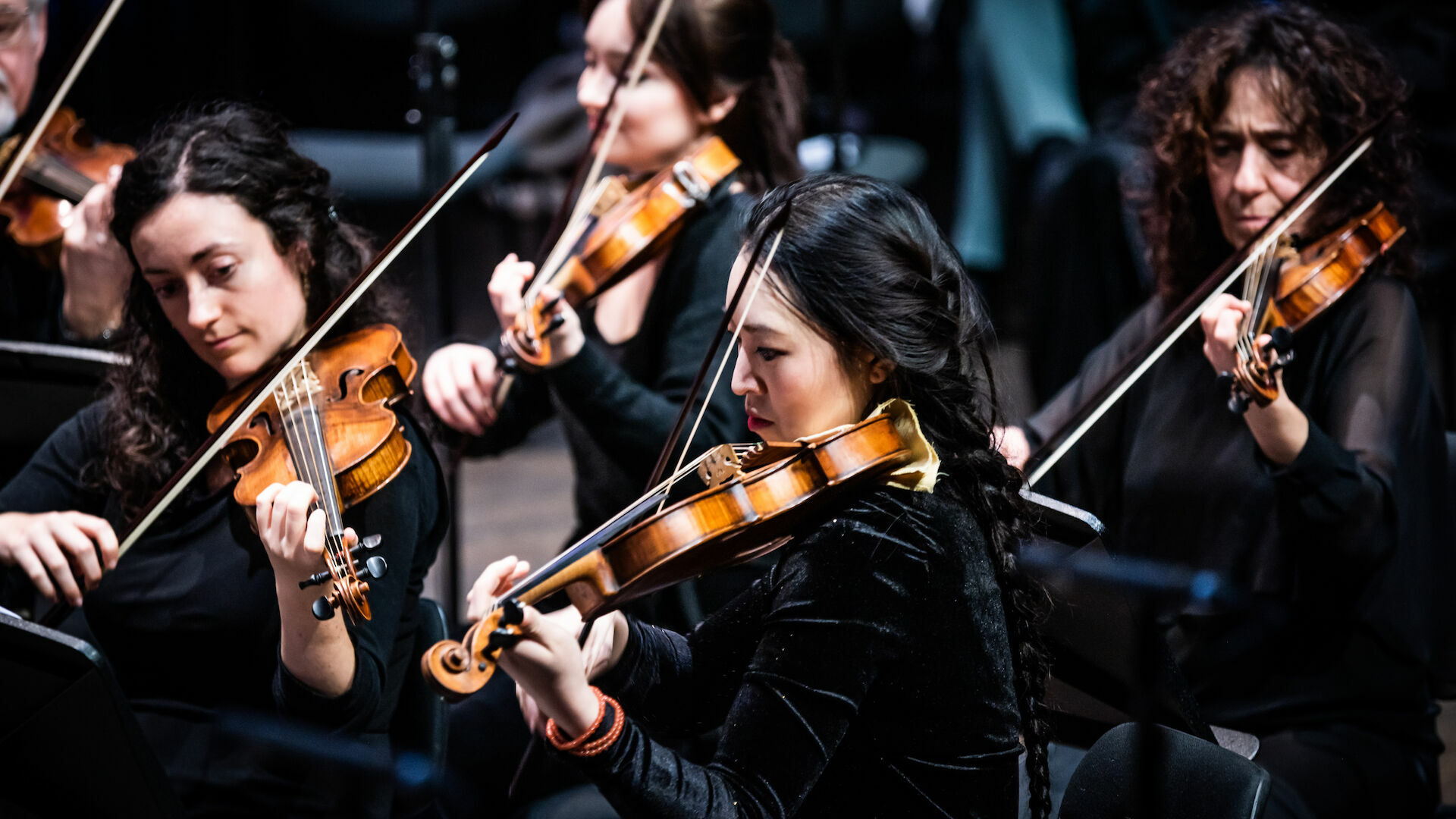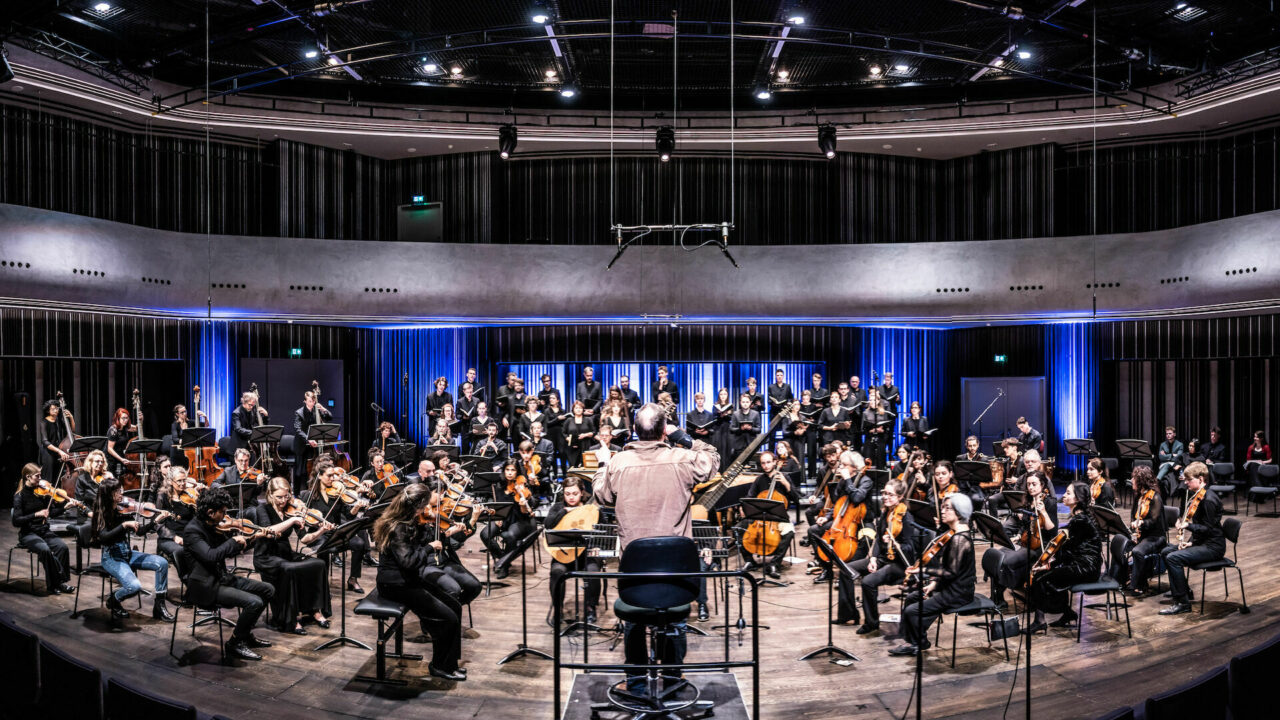Side by Side is an annual highlight of the Royal Conservatoire's programme. Students from the Early Music department are given the opportunity to perform with the Orchestra of the Eighteenth Century. For the 2023 edition, the successful formula was expanded to include the talented students of the Vocal department and members of Cappella Amsterdam. Shoulder to shoulder, the celebrated professionals and the eager new generation of singers and instrumentalists performed Händel's Messiah under the baton of one of the Orchestra of the Eighteenth Century's favourite conductors, Daniel Reuss. The concert was a great success. Violinist Saya and singer Famke share their experiences with us.
Saya: 'The Side by Side concert is always something we look forward to in the Early Music department. The Orchestra of the Eighteenth Century is an ensemble that we look up to and it is great to play alongside them. The musicians are super friendly and helpful with everything. We had a whole week of rehearsals before the concert.'
Famke: ‘With the choir, we already started from January with sectional rehearsals and in February started rehearsing with the whole choir. The week before the spring break we met the Cappella Amsterdam singers and the week after the spring break the rehearsals with the orchestra started. It was great that the Cappella Amsterdam singers were there for the full week. We could ask them questions all the time, which was a fantastic learning experience.’

Focus
Saya: 'You could feel a big difference in the atmosphere and focus during the rehearsals from a normal project for the students. Many times in the violin section, the front desks are much more active than the people in the back. But not in this orchestra; everyone is active, always listening and involved in the music-making. It stimulates you to stay focused all the time. In the string sections, we rotated seats in a way that everyone had the opportunity to sit in the front and in the back, and so would the members of the orchestra. You have slightly different roles as a player in the section when you are in the front or in the back. It was very inspiring to experience that difference.’
Famke: ‘When you are standing next to professionals, you obviously want to look good. So everyone was really eager to learn and did their best. The fact that Daniel Reuss is such a big name in the music world makes it even more stimulating.
It was also nice to be able to imitate the way the professionals behave in rehearsals and concerts. I think that's something that's really important for this stage of our development because we are almost always around students and they are also finding out how to behave. It was nice to be able to copy that from people with a lot of experience, who know it already.’
Lessons
Saya: 'The most important thing I learned in Side by Side was that accompanying a choir is really different from just playing instrumental orchestral music. Watching Catherine, the concertmaster, I learned a lot about how to properly accompany a choir. By being active and listening very carefully. I was really inspired by the professionals. During Easter I played a lot of passions, normally I wouldn't like to play the chorales because I thought they were a bit boring, but now I do it in a different way. I learned that there is a lot to pay attention to.
It was also really great to be able to chat with the orchestra members after rehearsals or sometimes during sectional rehearsals.’

Famke: ‘One thing that was a good learning experience for me was how to sing in a healthy way. It was a long week full of rehearsals, and singing in a big group. And I learned a lot from the professional singers about how to take care of my voice in these situations.
But the biggest lesson was that everything has to be incredibly precise. The details of the piece make it amazing. As a singer you have to do more than just sing beautiful lines, you have to really listen to what instrument in the orchestra is playing that line with you. On a project like this, you really immerse yourself in the musical structure.
We got a lot of feedback from the conductor and sometimes it is difficult to translate the feedback into what you actually need to change about your personal technique. The choir members have so much experience in this. They know exactly what the conductor means and what we should do to achieve it.’
Milestones
Famke: ‘Singing the Messiah for the first time is definitely a big thing in your career. Before this project started, I thought I knew the Messiah really well, because it is performed so often. But when I started to study it, I found a lot of things I had never heard before. When you go deeper into the work, you discover so many things, and all these more unknown parts of the Messiah are so beautiful. It really feels like a milestone!
At the beginning of the week, they said it would be life-changing and I thought that was probably a bit of an exaggeration. But in a way it was, because you learn so much in one week and so many different elements come together. You have one foot in a safe student environment and the other foot in the professional world, so you really feel looked after, but you still have to put yourself out there.’

